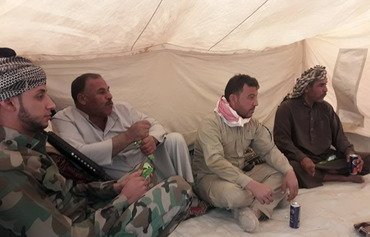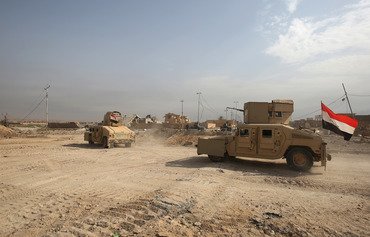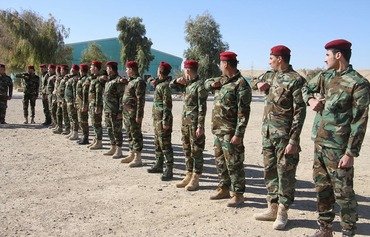Anbar province tribesmen continue to play an active role in the push to drive the "Islamic State of Iraq and Syria" (ISIS) out of western Iraq.
Some 11,000 tribal fighters are battling alongside the Iraqi forces and helping to hold liberated cities throughout the province, Anbar provincial council member Karim al-Karbouli told Diyaruna.
"They are officially registered and receiving wages," he said. "But at the same time, about 8,000 [local residents and tribesmen] are volunteering without any compensation."
These volunteers provide support to tribal and security forces whenever ISIS elements stage unexpected attacks in their areas, al-Karbouli said.
"With any attack, the number of tribal fighters increases automatically, and they line up together to repel the terrorists," he added.
Tribal support is not limited to defensive operations, he said, noting that tribal fighters also take part in liberation battles launched by the Iraqi forces.
Last month, more than 1,300 tribal fighters -- most of them volunteers -- took part in the battle to retake Akashat, near the border with Syria, al-Karbouli said.
Tribesmen are 'indispensable'
Tribesmen have played an indispensable role in the liberation battles, al-Karbouli said, making many sacrifices and providing significant support to the security forces.
They are now helping to drive ISIS from its last remaining stronghold in the westernmost part of Anbar, he added.
To enhance the tribal contribution, al-Karbouli said, it will be necessary to equip these fighters with more weapons and supplies, and pay them sufficient salaries.
Wounded tribesmen and the families of those who lost their lives in the battle to oust ISIS from the province also should receive compensation, he said.
Meanwhile, fighters from the western Anbar tribal force are enjoying widespread public support, said Col. Jamal Shihab al-Mahalawi, the force's commander.
"Local residents spare no effort to help us," he told Diyaruna. "They stand with us and with the security forces and raise our morale."
"There is moral support through the media and social networking sites, and all segments of society in Anbar agree to strengthen this harmony," he added.
"When we need people to fight, they do not hesitate for a second to take up arms," he said, noting the "popular cohesion with the security forces and the tribes".
About 200 fighters from the western tribal force took part in restoring the districts of Anah and al-Rayhanna to Iraqi control last month, al-Mahalawi said.
The recent victories can be attributed to the strong support from the local population and volunteers, especially members of the tribes of Albu Mahal, al-Salman and other western Anbar tribes, he added.
Popular support for tribal fighters
"We are all able to protect our cities, and we will not allow terrorism to return to them under any pretext," al-Mahalawi said. "We have sufficient readiness to maintain security and fight alongside our security forces and provide them with intelligence."
"The people express to us their moral support on every occasion," Haditha tribal forces commander Sheikh Awad Saeed al-Jughaifi told Diyaruna.
"When our fighters come from the battlefield, the citizens receive them with cries of joy, hold spontaneous festivities for them and support them by whatever means available," he added.
These victories quickly become the talk of the street and social media, he said.
"This is repeated with any city or region we liberate," al-Jughaifi said. "Its inhabitants, who have experienced hunger and starvation, are very happy, helping us uncover terrorist hideouts and co-operating with us."
Tribesmen and the Iraqi forces stand as one against terrorism, he added, and impose their control over all liberated territory in Anbar.
Al-Jughaifi called for an increase in the number of tribal fighters because of the size of the province, noting that sufficient numbers of local fighters need to be deployed to secure the desert and maintain security in the cities.

![Anbar tribal fighters prepare to launch an attack on the 'Islamic State of Iraq and Syria' in this photo, posed online on June 21st. [Photo courtesy of the Haditha city tribal brigade media office's Facebook page]](/cnmi_di/images/2017/10/11/9929-anbar-tribes-fight-600_384.jpg)






